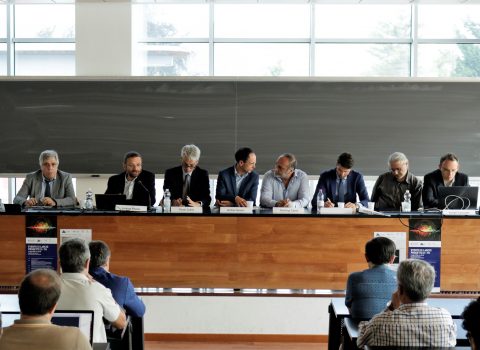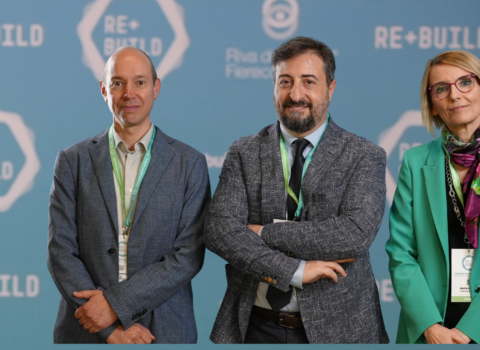
QUANTUM DAY @ FBK
A day of discussion involving the national research and innovation ecosystem on quantum technologies was held at FBK on May 23, 2023. A whole new level for supercomputing, communication networks, and the competitiveness of the production system, particularly for SMEs that represent the vast majority of the Italian industrial structure
The program of the meeting provided for two parts.
In the first part, after institutional greetings by the Councillor for Economic Development, Research and Labor of the Autonomous Province of Trento Achille Spinelli, three speakers presented their ralks:
1) Fabio Beltram, Scuola Normale Superiore Pisa, presented the National Quantum Science and Technology Institute (NQSTI) partnership of which he is the coordinator;
2) Simone Montangero, University of Padua, presented the National Center for High performance Computing, Big data and Quantum computing, as co-leader of the “Quantum computing” spoke.
3) Davide Calonico, National Institute of Metrological Research, presented the Quantum Italy Deployment (QUID) project, which involves the development in Italy of the European Quantum Communication Infrastructure and cross-border initiatives.
The parallel initiatives presented highlighted their respective areas of focus and areas of intersection or complementarity, showing a number of unprecedented opportunities with great potential for the national research and innovation ecosystem that relate to the quantum disciplinary field, precisely defining the related standards and outlining the specific steps planned at the present time.
1) Regarding NQSTI, Prof. Beltram highlighted the focus of the partnership, which aims to produce a repository of knowledge in the service of others, enabling quality research to be translated, in the necessary timeframe, into new market opportunities, particularly by referring to a level 4 technological maturity.
The initiative has been entrusted to a new institute involving 20 entities including companies (Leonardo SpA and Thales Alenia Space), universities and public and private research organizations. The hub-and-spoke organization sees FBK leading spoke 7 (Complete systems).
The total budget available is 116 million euros and the ambition is to become the point of reference for companies (“one stop shop”), the right place to find support and personnel to create the foundations of a new national high-potential supply chain.
Through research, education and innovation activities, the entity is making it possible for the country to participate in Quantera, the pathfinder European collaboration scheme for this industry.
The resources will be used for the creation of prototypes for companies, the construction of networks for the creation of new companies, and the structuring of programs dedicated to encouraging small, medium and large enterprises to apply quantum paradigms with the aim of achieving a whole new level in the national production system. In addition to the 322 researchers provided by the partner institutions, a placement service will be activated and, thanks to a financial package for talent attraction, additional resources will be devoted to “brain drain reverse” incentives
2) Prof. MONTANGERO presented the activities of the ICSC Foundation – National Research Center in High Performance Computing, Big Data and Quantum Computing, based in Bologna and in connection with the metropolitan area, which has always been a laboratory of innovation, particularly with a marked focus on sustainability, participation and digital technologies, as proven by the urban digital twin initiative, with FBK leading spoke 9 on Digital Society & Smart Cities.
The Foundation’s goals are 5:
- World class infrastructure: the hardware of the future
- Living labs: because innovation is also a participation challenge
- Centers of excellence: to push beyond the frontiers of knowledge
- Integrated ecosystems: from research to market
- Leadership: managerial skills to lead the transition
80 million will be allocated to calls to activate these lines of action, with a staff provided by the partners of 1575 researchers and support professionals, joined by an additional 250 permanent staff and 300 doctoral students.
The ongoing quantum revolution is based on the consideration that the technology of the past 50 years can no longer go on as it is. What would happen if a computer followed the laws of quantum mechanics? Many computational problems would be solvable more efficiently, not just faster. The benefits imaginable through examples of application (so-called quantum as a service qaas) are not few: from Shor’s factorization algorithm in banking to optimization in airport logistics contexts, or in planning satellite constellations or in health care to set up cancer therapies by reducing waiting times from a day to a couple of hours at most. The central goal is “to have Italy play a role in the European supply chain of building quantum computers,” and this can be done on various physical platforms, resulting in different hardware possibilities. Sustainability is a big challenge to be faced, if we think, for example, that Bologna’s Leonardo supercomputer, fourth in the world in terms of computing power, will consume at full capacity as much power as 180 thousand people, basically the same power as the whole city of Modena. For the time being, quantum simulation algorithms are being adopted to figure out what can be done when next-generation computers become available. Last but not least, the ICSC Foundation will release open source software to facilitate the dissemination and adoption of the new paradigms under construction.
3) The third building block is quantum communication as a technological response to a growing demand for security in Europe. The QUID public-private consortium, which takes advantage of the existence of a quantum fiber backbone and involves five large companies and four SMEs. This synergy with the pre-existing infrastructure has configured an all-Italian supply chain here with a European positioning. Davide Calonico outlined the challenges posed to research and industry, starting with standardization and certification, setting the ambitious goal of world leadership by 2029. Doing this will require research and innovation, orchestrating the operation of traditional/quantum keys, and developing the quantum network through the extension of the national network by activating new connections across borders in the direction of Greece and Malta in the south, to Switzerland, France, Austria and Slovenia in the Alps area, particularly in the northeast via Trento and Trieste.
________________________________________
An open panel discussion was held in the second part, moderated by Donatella Proto, Ministry of Enterprise and “Made in Italy” (MIMIT) and Francesco Saverio Cataliotti, National Institute of Optics – CNR-INO. The event was also an opportunity to share expectations and raise questions about the elements of uncertainty surrounding the implementation and institutional framework of many of the measures of interest. A common factor in all the initiatives was the lack of administrative guidelines to get the programs off the ground. Speakers stressed the urgency, as well as the importance, of filling this gap.
Case studies presented included IBM, the Port of Trieste and Quantonation, a venture capital fund with 91 million euros invested that considers Italy an attractive market. The discussion showed that, given the national production structure, the most challenging goal for the country system is technology transfer to SMEs. This implies dissemination among citizens through appropriate use cases and commercialization of solutions from research to enterprise to unlock the economic potential that lies ahead.




